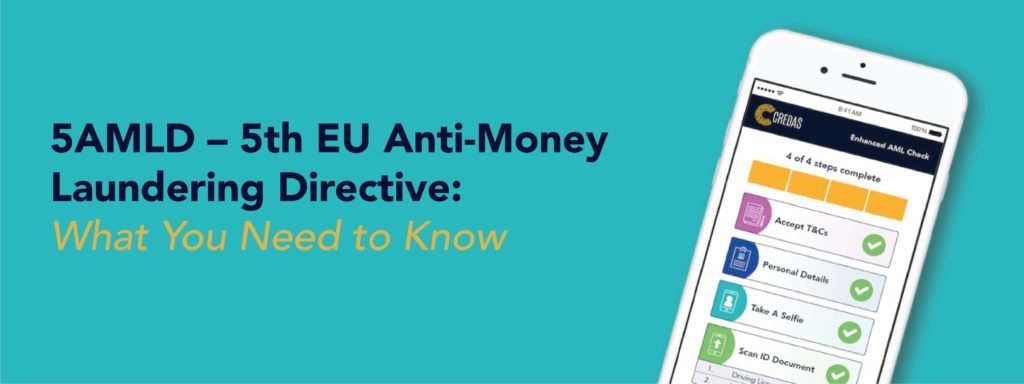
European Parliament announced that it would adopt the 5th EU Anti-Money Laundering Directive (5MLD), giving EU members 18–months to transfer the directive into law. The deadline is January 2020.
Policymakers didn’t hang around to — after only ten months. Introduced in June 2017, the 4th Anti-Money Laundering Directive (4MLD) fundamentally changed the way businesses handle Money Laundering.
What’s different about 5AMLD?
Unlike the 4th Directive (that imposed extensive changes in how businesses approach to manage and comply with Money Laundering) the 5th EU Anti-Money Laundering Directive isn’t as widespread.
5AMLD is more a series of amendments and adds various additional obligations that weren’t initially included in the 4th.
Unlike its predecessor that detailed introducing a risk-based approach and removing automatic exemptions form due-diligence.
These additional obligations include a focus on improved powers for direct access to information and enhanced transparency around beneficial ownership data.
5MLD consists of:
- Regulations for virtual currencies, such as Crypto and Ether, and pre-paid cards, to prevent terrorist financing.
- Improvement safeguarding for financial transactions sent to and from high-risk countries.
- Ensuring centralised national bank and payment account registers or central data retrieval systems are accessible in all member states
Some of the key dates that are worth making a note of are:
– 10 January 2020 – Beneficial ownership for corporates to be set up
– 10 March 2020 – Beneficial ownership of trusts to be set up
– 10 September 2020 – Centralised automated mechanisms to allow identification of those who hold or control payment accounts and bank accounts to be set up
Enhanced Due Diligence
When dealing with transactions from high-risk countries, the 5th Directive will require enhanced due diligence checks like PEPs (Politically Exposed Person) and Sanctions.
In addition to recording evidence – such as the source of the funds and wealth, information on beneficial ownership and the background to the proposed transactions are recorded going forward.
The EU may also designate a ‘blacklist’ of high-risk countries for money laundering.
Electronic Identification
The amendment will also revise the requirement in the 4th to provide ‘reliable and independent source’ for the verification of customer information – to include ‘where available, electronic identification means’.
This suggests that the source will have to be ‘deemed’ as reliable, independent and electronic.
This could represent a significant change for many businesses who have been slower to embrace technology solutions as part of their due diligence processes.
Beneficial Ownership
The Fifth Directive goes further than what was outlined and introduced in the 4th by way of allowing public access to beneficial ownership records, even without having to demonstrate any ‘legitimate interest’ and the threshold for identifying beneficial ownership reduced from 25% to 10%.
The fourth directive called for the establishment of beneficial ownership registers and for these registers to be made publicly available, which according to a recent Parliamentary research briefing, the government won’t have in place until 2021
This will be a hugely challenging area for regulated entities. Without a public register available, other solutions will need to be explored that will again add cost and time.
Regulating Crypto Currencies
Virtual currencies like Bitcoin, Ethereum and Ripple, will have legal definitions under the 5th, and wallet providers will also become regulated entities as part of the directive.
This means that while many may already conduct due diligence and report suspicious transactions, the Fifth Directive will make it a legal requirement.
Cryptocurrencies have caused a bit of a headache for money-laundering prevention over the last few years, and some regulators have taken a fearful stance, concerned it allows criminals to more easily transfer illicit cash around the world.
Others have in part welcomed its openness and transparency, particularly the opportunities in banking and finance presented by the new technology of blockchain.
Prepaid Cards
Some Money laundering regulations are already in place for pre-paid cards, however one the 5th becomes law, and these amendments mean the limits to top-ups will be lowered from €250 to €150 and even to €50 for remote transactions.
The directive will prohibit the anonymous use of prepaid cards issued outside the EU unless the jurisdiction is deemed to have equal money-laundering rules to the EU.
Increased reach & protecting Whistle-blowers
The Fifth Directive has also been extended to cover all forms of tax advisory services, lettings agents and art dealers too.
The general public will have access to request information on the real owners of businesses operating in the EU, this addition to the directive is aimed at exposing companies created solely to launder money and hide wealth and whistle-blowers who report money laundering will also have increased protection and the right to anonymity.
Need to comply? Here’s how Credas can help.
Need help complying with the 5th EU Anti-Money Laundering Directive?
Credas’ technology and data checks can be used across multiple markets and financial services to make sure you meet and exceed your regulatory requirements.
Our mobile-enabled platform provides real-time results on desktop or mobile and allows you to verify remotely, or in person, meaning you can check at a time and a place that suits both the business and the client.
Credas provides you with technology that combines ID verification and facial recognition enabling your business to perform due diligence checks in real-time and confirms the authenticity of the ID document and that it matches the individual.
So whether you’re an estate agent, a solicitor, a bank or prepaid card provider – Credas ‘ real-time identity and ID document solutions will provide you with the tools to ensure that you are 5AMLD compliant.
Get in contact with Credas today!




